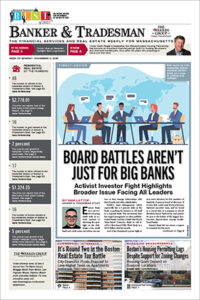Daniel Hartman
Of Counsel, Nutter
Industry experience: 12 years
Age: 38
After over four years as Counsel at the Federal Reserve Bank of Boston, Daniel Hartman has joined the private sector at Boston law firm Nutter, where he’s helping local banks make sense of regulatory moves.
While with the Boston Fed, Hartman got an up-close look at bank regulation and also advised the Federal Reserve’s Main Street Lending Program. The CARES Act directed the Fed, which traditionally lends only to banks, to lend to small businesses as well and help them make it through an incredibly tough financial environment early in the COVID-19 pandemic.
While at the Fed, Hartman also represented the Boston Fed in multiple investigations and audits, including before Congress, various inspectors general including the Special Inspector General for Pandemic Recovery, the Securities and Exchange Commission and the Department of Justice, in addition to internal investigations.
Now, Hartman focuses on representing banks, credit unions and other financial institutions in regulatory, transactional, supervisory and enforcement matters.
Q: What was your experience like working at the Federal Reserve Bank of Boston and what did you learn while working there?
A: I’ve had a long interest in doing public service, and that seemed like the right moment for me to sign up and join. I advised the Main Street Pending program, effectively, about an $18 billion in-house bank supporting small businesses that were affected across the country, and helped keep the lights on and get them through the pandemic. In addition to that, just also as a long-time banking lawyer, I have always been interested in the supervision and regulation of banks, and going to the Fed was an awesome opportunity to just go and learn the other side, and learn how bank regulation happens, how it works. I think that provides value to our banking clients [at Nutter] when we’re able to talk through what’s happening at the Fed and maybe why.
[At the Boston Fed,] I was also making sure that banks were able to achieve their liquidity needs in an emergency situation, that was helpful during the bank term funding program that was launched out of the [Silicon Valley Bank] failure and the crisis that came out of that. The other area was just traditional bank regulation and supervision: counseling and working with bank examiners, working with an applications team that are reviewing and processing merger applications, and bank holding companies looking to merge or enter into new activities and things like that. Also, I had an opportunity to work on master accounts and had access to the payment system, which became a pretty interesting topic and the subject of nationwide litigation during my time.
Q: Based on its public statements and its big layoffs at the FDIC and CFPB, it seems like the Trump administration wants lighter financial regulation. From your experience, what kind of ripple effects could that have?
A: The way I think of it is proper and safe regulation is kind of the starting point. Everything that I’ve been seeing so far out of all the appointees that are in this specific sphere, the bank regulatory sphere, while they may be opening up new avenues for banks to engage in things like crypto activities or stablecoins and custody of crypto assets, in addition to making it a smoother process for community banks to merge and seek other ways of revenue. I think every single time I’ve seen a line in a speech or a new policy, it’s come with in a safe and responsible manner. I’m pretty confident that while you can change the leadership of these agencies, the bank examiners are still the same. They still understand the core of safety and soundness and I think in the wake of the SVB crisis, I think you’re even seeing a more elevated focus on core risks like interest rate risk and credit risk and liquidity risk.
Q: Especially thinking about small businesses recently dealing with economic uncertainty, how was the Fed able to help out small businesses and how important of a role do they play in the local economy?
A: The lifeblood of the economy is small businesses and the lifeblood for small businesses is access to credit. So, without the banking industry – and without the Fed during that [pandemic] period – small businesses can’t thrive. I think that’s what you’re seeing out of a lot of leadership. I think you’ve seen this in particular, we’ve seen a lot of consistency from this, out of [Fed] Gov. Michelle Bowman, who’s the nominee for vice chair of supervision. A lot of her speeches go through the fact that the business models of community banks, where they are strongest is in the small business communities. They’re able to get to know the owners in the cities and towns, and it creates for a better underwriting experience and a more effective one.
Q: How did everything that you learned while working for the Federal Reserve of Boston help you now, as you progress in your career?
A: I was a banking lawyer for six years, and I didn’t know how things worked at the Fed. You often send in questions. You won’t hear back for days or months and sometimes banks are like, ‘Hey, what’s going on?’ And now, while I don’t know what’s going on now that I’m back on the outside again, I can kind of guess and I can make a much more educated guess these days than I could before. I’m able to talk to clients about their issues before they bring them to the regulator. A lot of times, clients and banks want to come to the regulator prepared, and so I’m able to look at things from a regulatory lens before it goes in front of the regulator, I think that’s proved incredibly valuable.
Hartman’s Five Favorite Mass. Historical Figures
- Paul Revere
- John Adams
- Abigail Adams
- John Glover
- Elbridge Gerry







